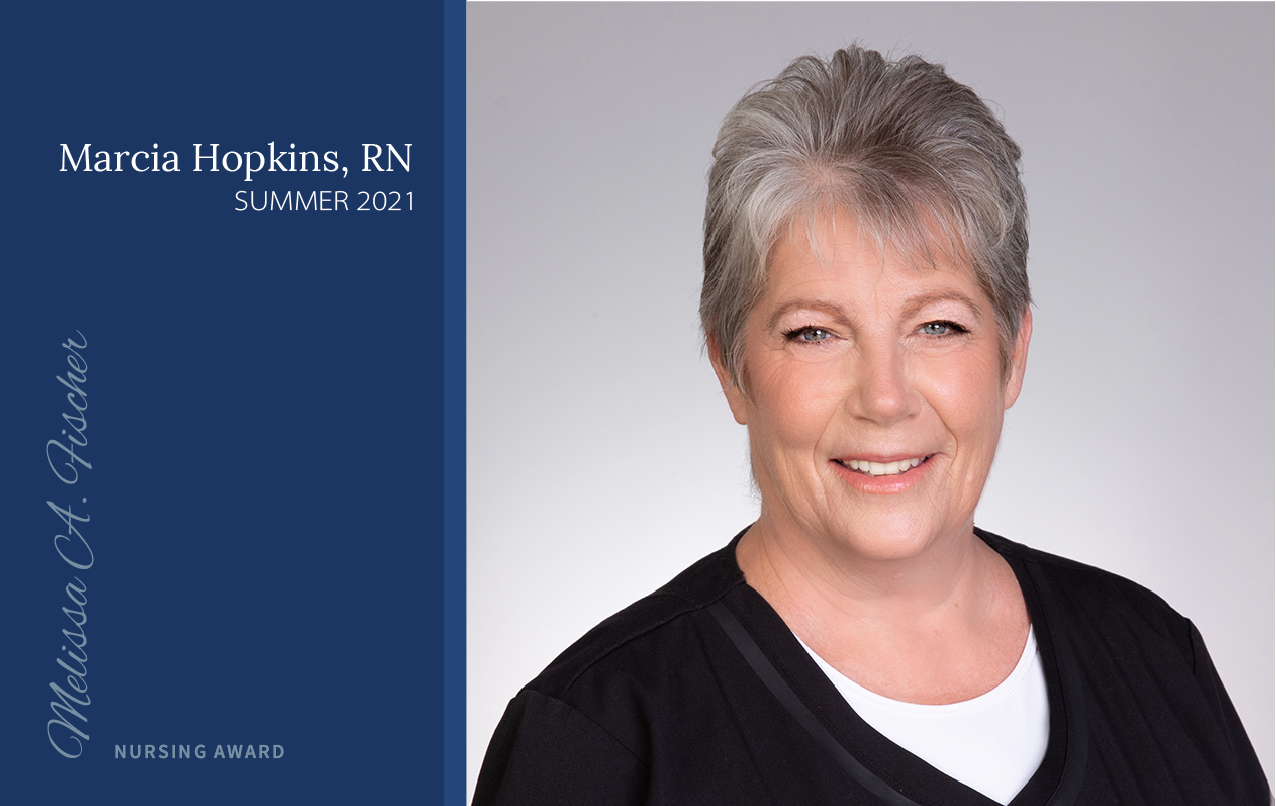Marcia Hopkins, RN, BSN spent thirty years as a telecommunications engineer, then decided it was time to give back. When her father was recovering from strokes and heart attacks, she was “the one family member that you don’t want to deal with.” Now she’s a hospice nurse on the other side…
Hopkins was recently named the Summer 2021 Recipient of the coveted Melissa A. Fischer Nursing Award.
Journey to Becoming a Hospice Nurse
IN THIS ARTICLE
What inspired you to become a nurse?
I was in telecom for 30 years, as a network engineer, and my position was going to sunset. It was time to give back. And nursing was a good way to give back.
Switching careers to nursing is not easy. Who or what helped you along the way?
I guess it had something to do with my dad’s illnesses. My dad has cheated death three times through major strokes and heart attacks. And I kind of stepped in as the family member— “The one family member, you don’t want to deal with”—asking questions and getting facilities and trying to help my family through these healthcare crises. That’s where I got it started.
Believe it or not, taking care of my horses also. I have a little 30 acre farm in Iowa. I have a mare that ripped her pectoral muscles open, trying to get her colt. She ran through some barbed wire and she had about 400 stitches to put her back together and the vet put me in charge of basically giving her NIM injections every day, and washing her wounds. So even that little bit of veterinarian practice taking care of sick farm critters got me interested.
So, you must really miss your horses being out here.
I do. I will totally confess I’m home sick. I’ve met some fabulous people here. Iowa’s quiet. I live in a village of about twelve houses and about eighteen dogs. Just stand in the road and you talk to anybody driving by, we all wave at each other.
Your path to becoming a hospice nurse was not conventional. Tell us a little about it.
So, I started working on my associate’s in nursing in 2008, and got my Associates in 2009. I was licensed as an RN. I started as a hospice volunteer because I wasn’t quite ready to give up my engineering job. So I volunteered in hospice for three years. And then in 2014 I started an ADN to BSN program. I earned my bachelor’s in nursing in December 2016. When I graduated I transitioned to nursing full time in 2017.
My first full time nursing job was in 2017 at the University of Iowa. So up until 2017 I’ve either been a volunteer, or did a short stint in long-term care.
I spent 30 years in telecom and 8 years in nursing. I have really enjoyed my journey.
Really beautiful. Very inspirational.
Thank you. Wasn’t supposed to be. Just something I enjoyed doing.
I think it’s really inspirational. It’s never too late to make a change, and to make an impact too. Not just any change, but a change that requires arduous studying and training–all for a true purpose.
What was your first work experience as a nurse?
My first official work experience was as a weekend charge nurse in a long term care facility. I worked my regular full time job as an engineer during the week. And, it was terrible. Terrible, terrible, terrible, it was. It was basically pressure to get the meds out. There was never enough staff. It was one nurse with 15 patients, trying to get through three med passes and it was just rushing when they needed a nurse to hold their hands. They needed a nurse to take them to the bathroom and respect their dignity, and that was the last place where you could get respect for your dignity. So, it wasn’t a good thing.
Yes, nursing is all about giving the meds on time and meeting the paperwork requirements, but really it’s about listening to the patient, hearing their concerns, and also their fears and their pain.
…really it’s [nursing is] about listening to the patient, hearing their concerns, and also their fears and their pain.”
And that’s why I love the palliative care unit at the University of Iowa. The staff there were fantastic. If you, as a nurse, said to the doctor, “We need this.” You had the meds ready within minutes. If this patient needs it, we’ll do it.
Their conversations with the families were just amazing. I aspire to be like them. Beautiful team. I wish I could have stayed with them, but again the circumstances didn’t allow it.
How did you find your specialty in nursing?
I spent two years in surgical nursing and I found that I didn’t care for that environment at all. I went to a continuing ed class and I got a three day course on end of life care and I thought, “This is what I want to do!” I talked to the person who happened to be a volunteer coordinator for a hospice agency and she goes, “I want you!” And so that’s how I got into hospice care. It completely changed my attitude about nursing. I thought, “This is where I need to be.” That’s how I found hospice.
It completely changed my attitude about nursing. I thought, “This is where I need to be.”
What brought you to NurseRegistry?
My parents are here in California and are getting on in their years. I moved out in August to be around to help out and help take care of them. Before moving out, I spent my weekends searching online–when I wasn’t on call for surgery.
I found NurseRegistry and I thought, “That’s the kind of agency I want: no stress, flexibility, independence, and a variety of options.” I thought, “this is good.” NurseRegistry was the first place I applied to.
Then, I just really enjoyed my first nursing assignment with NurseRegistry. Doing the kind of nursing I like, you know, focused on the patient, families, and just providing care to the best of my abilities.
Are you working anywhere else alongside NurseRegistry?
No, I just love the flexibility. It’s exactly what I need right now. Micah’s just fabulous and everyone else too that I’ve come into contact with.
Everyday Life as a Hospice Nurse
What’s your favorite part of being a hospice nurse?
Caring for the patients and their families.
What makes you smile at work?
Knowing that I care for someone in the best way possible. Relieve their pain, relieve their discomfort.
That we’ve shared a moment together in any way that we can. Whether it’s the person with aphasia and you get a smile, and we understand each other.
you get a smile, and we understand each other”
What keeps you going on tough days?
Tough days when you’ve been challenged by a family member or a patient is refusing care, just taking a deep breath and knowing that we’re going to work through this plan together. I don’t know if I have a good answer that could help others.
I think that is helpful. Also, it sounds to me like you’re a tough person and you take everything in stride.
Well, let’s just say my whole life—my whole prior profession—I designed networks and I implemented networks and I dealt with Fortune 500 clients and things like that, so I’m used to the pressure. I’m used to responsibility, I’m used to being on call 24 hours a day seven days a week. I did that all the time.
After that, I have to explain the unexplainable. This is an analogy from my former life. I worked for a company that made computer systems for banks to run their ATM networks. I’ll never forget the day where I had to go to Wells Fargo Bank on the day that our fault tolerant computers that are never supposed to go down, went down and they crashed 3000 ATMs. And I had to explain the $20 million you spend on software to not ever fail, failed. A lot of talking.
Inspirations from Nursing
Is there a time when you almost quit, and then didn’t and what kept you going?
I had one particularly challenging family member. He challenged every one of us on the staff. All of us were put through the wringer by this family member and with understanding we all worked it out. We just had a couple of really intense days. So yeah I was close to quitting an assignment once, but I wasn’t alone. We worked together to provide the best care for the patient and the family member. Ironically when all was said and done he was the one who praised us all the most.
What inspirations have you come away with from your life as a hospice nurse?
A patient putting every effort into to comply with rehab, and to make progress on their journey. I think that’s been a big inspiration. Coming through a very difficult situation and making progress. The love that they show for their family members to make that commitment to rehab. The love of family members, and then the love of the patient for their family to make that commitment.
And my dad’s another example. He’s overcome all these obstacles, after his first stroke. He loved us enough to make as close to a full recovery as he could. He actually went back to work for six months, very determined.
Can you share any life lessons you’ve learned from being a hospice nurse?
Oh, well, yes, life can change in a moment quickly and dramatically, and to treasure the time you have with your family.
treasure the time you have with your family”
As nurses we’re very privileged to share the happy moments of rehab with families. And it’s true of end-of-life too, a very spiritual moment. A very, very, very human time.
Self-Care for Nurses
Being a hospice nurse can be exhausting. How do you relax or re-energize?
I do a lot of walking. When I was on the farm I was taking care of my animals on my farm which I think did the best to recharge my batteries.
But, in lieu of not being close to nature everyday I get outside and I walk a lot.
I’ve just taken up weightlifting. You sleep so much better after that. Years ago I studied martial arts. When I went to nursing school, I couldn’t commit to both. I gave up martial arts and went into nursing. With COVID I can’t really can’t go back to that right now.
Recently I found this great gym over in Menlo Park. Extremely intense weightlifting. You push the weights very slowly ten seconds to lift the weight, then ten seconds to bring it down. That is the most intense twenty minutes of your week. Actually you do it twice a week. Wonderful. The thing is you’re done, you’re not pedaling around in the gym endlessly. You’re in the gym with one trainer, a little tiny place in Menlo Park. They’re wonderful. I’ve been doing it for about six weeks.
You must feel much stronger, much more capable.
I just feel sore as hell.
Last question, do you have any favorite nursing books or podcasts or social media accounts you follow?
Oh yes, yes, my dear friend from the University of Iowa. She’s a former social worker. Nursing Uncensored podcast. She is just a hoot. Adrianne is just as wonderful in life, as she is on the air.
And then I listen to Clinical Problem Solvers when I go on walks. It’s actually a bunch of doctors and residents, discussing exotic medical cases on the podcast. It’s just a good mental exercise in using clinical reasoning.
Nursing biography, the one was Home Before Morning by Lynda Van Devanter, which is the story of Vietnam nurses in the battle zone. And The Untold Story of The American Women Trapped On Bataan By Elizabeth Norman. That was another one about nurses in battle in combat in World War Two, in the Philippines, who were captured. Both very inspirational books.
That concludes our interview. It’s been wonderful chatting with you.
Thank you. It’s been lovely chatting with you as well.





